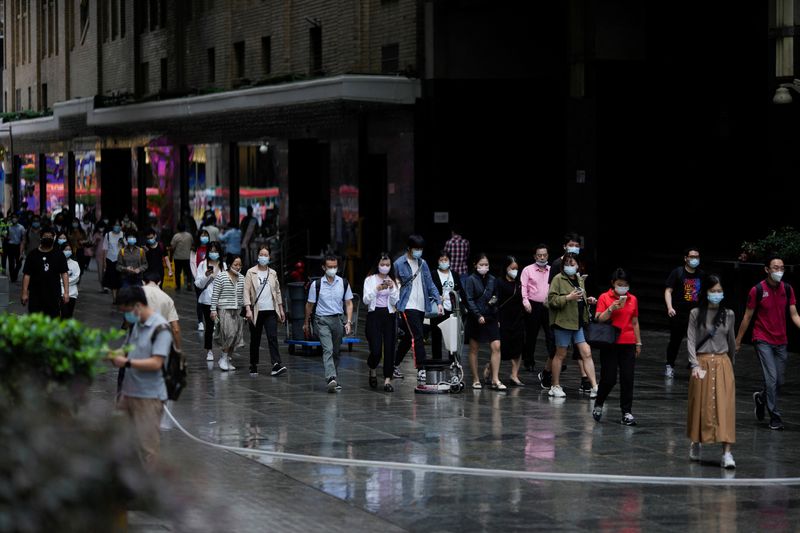By Kevin Yao
BEIJING (Reuters) - The third quarter for China's economy is likely to underline the intensifying challenges at home and abroad, a Reuters poll showed, as an expected rebound in growth will still leave it poised for one of its worst years in almost half a century.
Stringent COVID-19 curbs in the world's second-biggest economy, disruptions to energy and food supplies caused by the Ukraine crisis and slowing global growth due to sharp rises in borrowing costs to curb red-hot inflation have all conspired to darken the outlook.
China's gross domestic product (GDP) likely grew 3.4% in July-September from a year earlier, quickening from the 0.4% pace in the second quarter, according to the median forecast of 40 economists polled by Reuters.
On the face of it, the rebound appears sturdy although recurring COVID flare-ups and a deepening property slump have meant the economy isn't firing on all cylinders.
Growth is expected to pick up to 3.8% in the fourth quarter, bringing the 2022 pace to 3.2%, far below the official target of around 5.5%. Excluding the 2.2% expansion after the initial COVID hit in 2020, it would also be the worst performance since 1976 - the final year of the decade-long Cultural Revolution that wrecked the economy.
"The economy is likely to come under downward pressures in the fourth quarter, but it could see a period of recovery into next year," said Nie Wen, a Shanghai-based economist at Hwabao Trust.
"Still, it will be difficult to see any strong recovery given weakening global demand."
The economy narrowly escaped a year-on-year contraction in the second quarter when major cities - including the commercial capital Shanghai - imposed lockdowns to contain rising coronavirus cases under Beijing's strict zero-COVID policy.
Investors will look for policy signals from a historic congress of the ruling Communist Party due to start on Sunday.
On a quarterly basis, GDP is forecast to rise 3.5% in the third quarter, versus a drop of 2.6% in April-June, the poll showed.
Analysts have repeatedly cut their growth outlook this year. The expected 2022 growth would be lower than 4.0% analysts had forecast in a Reuters poll in July and 5.0% in April's forecast.
Chinese leaders, seemingly resigned to the lower growth trajectory for the year, have played down the importance of hitting the official target of around 5.5% for 2022, which was set in March.
Apart from domestic headwinds, Chinese exporters also face a tough time as the global economic outlook darkens.
The government is due to release third-quarter GDP data, along with Sept. activity data, on October 18 at 0200 GMT.
Economic growth is forecast to quicken to 5.0% in 2023.
MODEST POLICY EASING ON CARDS
Policymakers have rolled out over 50 economic support measures since late May, channelling more money into infrastructure projects and cutting taxes for businesses.
More support is expected from the People's Bank of China (PBOC), its governor, Yi Gang, said on Friday
New bank lending in China nearly doubled in September from the previous month and far exceeded expectations after the central bank acted revive the economy.
Analysts expect the PBOC to trim the one-year loan prime rate (LPR), the benchmark lending rate, by 5 basis points in the fourth quarter, the poll showed.
In August, the central bank cut the one-year LPR by 5 basis points and lowered the five-year LPR by a bigger margin.
The PBOC is likely to keep banks' reserve requirement ratio (RRR) - the amount of cash that banks must hold as reserves - steady in the rest of 2022, according to the poll.
Consumer inflation is expected to quicken to 2.2% in 2022 from 0.9% in 2021, down from 2.3% in July's forecast and below the official target of around 3%, the poll showed. The inflation is expected to edge up to 2.3% in 2023.

Consumer prices rose 2.8% in September from a year earlier - the fastest pace in more than two years, driven largely by food costs, limiting the scope for policy easing.
(For other stories from the Reuters global long-term economic outlook polls package:)
(Polling by Anant Chandak, Veronica Khongwir in Bengaluru and Jing Wang in Shanghai; Reporting by Kevin Yao; Editing by Shri Navaratnam)